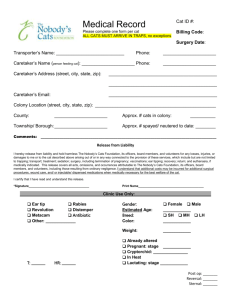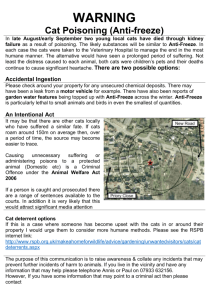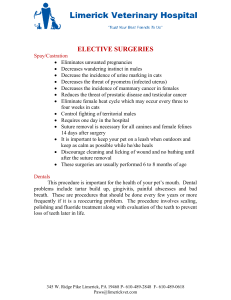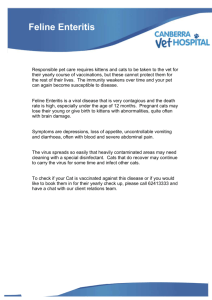Help Your Cat Age Gracefully
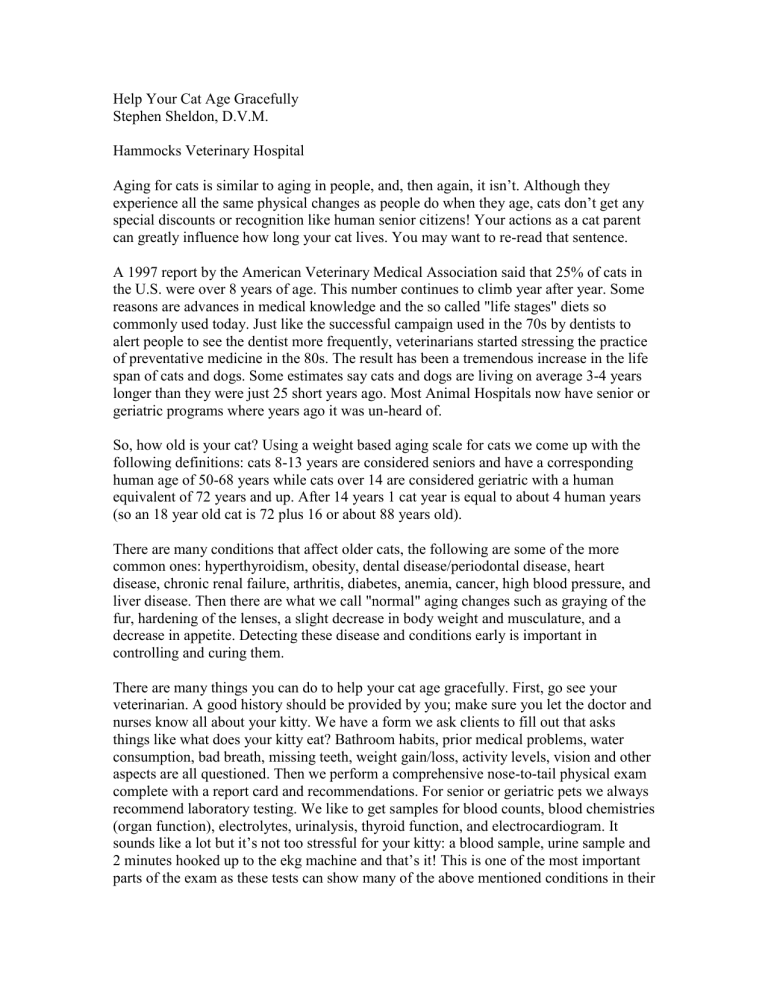
Help Your Cat Age Gracefully
Stephen Sheldon, D.V.M.
Hammocks Veterinary Hospital
Aging for cats is similar to aging in people, and, then again, it isn’t. Although they experience all the same physical changes as people do when they age, cats don’t get any special discounts or recognition like human senior citizens! Your actions as a cat parent can greatly influence how long your cat lives. You may want to re-read that sentence.
A 1997 report by the American Veterinary Medical Association said that 25% of cats in the U.S. were over 8 years of age. This number continues to climb year after year. Some reasons are advances in medical knowledge and the so called "life stages" diets so commonly used today. Just like the successful campaign used in the 70s by dentists to alert people to see the dentist more frequently, veterinarians started stressing the practice of preventative medicine in the 80s. The result has been a tremendous increase in the life span of cats and dogs. Some estimates say cats and dogs are living on average 3-4 years longer than they were just 25 short years ago. Most Animal Hospitals now have senior or geriatric programs where years ago it was un-heard of.
So, how old is your cat? Using a weight based aging scale for cats we come up with the following definitions: cats 8-13 years are considered seniors and have a corresponding human age of 50-68 years while cats over 14 are considered geriatric with a human equivalent of 72 years and up. After 14 years 1 cat year is equal to about 4 human years
(so an 18 year old cat is 72 plus 16 or about 88 years old).
There are many conditions that affect older cats, the following are some of the more common ones: hyperthyroidism, obesity, dental disease/periodontal disease, heart disease, chronic renal failure, arthritis, diabetes, anemia, cancer, high blood pressure, and liver disease. Then there are what we call "normal" aging changes such as graying of the fur, hardening of the lenses, a slight decrease in body weight and musculature, and a decrease in appetite. Detecting these disease and conditions early is important in controlling and curing them.
There are many things you can do to help your cat age gracefully. First, go see your veterinarian. A good history should be provided by you; make sure you let the doctor and nurses know all about your kitty. We have a form we ask clients to fill out that asks things like what does your kitty eat? Bathroom habits, prior medical problems, water consumption, bad breath, missing teeth, weight gain/loss, activity levels, vision and other aspects are all questioned. Then we perform a comprehensive nose-to-tail physical exam complete with a report card and recommendations. For senior or geriatric pets we always recommend laboratory testing. We like to get samples for blood counts, blood chemistries
(organ function), electrolytes, urinalysis, thyroid function, and electrocardiogram. It sounds like a lot but it’s not too stressful for your kitty: a blood sample, urine sample and
2 minutes hooked up to the ekg machine and that’s it! This is one of the most important parts of the exam as these tests can show many of the above mentioned conditions in their
early, treatable stages. These tests also serve as a great pre-anesthetic panel because you all know what is coming next.
Dental disease! Your cat needs to have his or her teeth professionally cleaned and polished. Tartar is 80% or so bacteria and these bacteria can get into the bloodstream through the gums and cause major problems in organs such as the heart and kidneys. I have rarely (if ever) seen a senior or geriatric cat that does not have dental disease. There is a general consensus among veterinarians that the number one thing you can do to help you cat live longer is to keep the teeth and gums healthy. I read an article on-line today reporting unbelievable statistical differences in the health of humans who brushed twice daily and flossed against those who only brushed once a day. I immediately bought stock in dental floss! There are a lot of theories why dental diseases such as gingivitis, periodontal disease, tooth loss, bone infections, and cervical neck lesions (the closest you’ll get to a cavity in animals) are so rampant in cats; these range from diet to breeding to environmental. Unfortunately you cannot change much about genetics or environment but you do have control over hygiene and diet. Some say a cats’ natural diet included chewing on bones, gnawing on tendons and stripping meat from their prey and that this kept the teeth healthy. Whereas today cats eat canned food or dry food, both of which can be pasty after mixing with saliva. We recommend feeding dry food as it does provide more chewing and abrasive action on the teeth and gums. Brushing is also helpful although difficult with cats; make sure you use animal specific products as human stuff contains detergents that can upset the stomach. Chew toys are also a good idea if your kitty will use them. And get your cats’ teeth professionally cleaned.
Diet is another important area for older cats. Older cats require fewer calories than younger cats; they also need less protein, less fat, and more fiber than their more active, younger friends. There are many good senior diets out there; get one. Also of good news is that major companies are now adding antioxidants to their vitamin lines. Previously we had to guess and use human products. An interesting study showed a tremendous increase in longevity among rats who were calorie restricted; this study was also duplicated with the same results in primates, monkeys and many other mammals. The guy who pioneered the work was 75 years old and looked 50! (although he did say he was hungry all the time). I can’t recommend this yet for your cat but it was an interesting study. However, we do know that fat cats don’t live as long as skinny cats. Special diets are also used commonly to treat many chronic conditions like kidney and liver disease and cancer. The good news is now the cats will eat them too as the pet food companies have finally done their homework.
So, in summary, the best way to ensure your cat lives a long healthy life is to have regular veterinary check ups and laboratory tests to detect diseases early . Watch what you feed your cat and how much. Take care of the teeth and gums. Have your cats neutered and spayed at an early age (see prior PT articles on breast cancer). Oh yes, and one last bit of preaching: keep your kitties inside the house!
